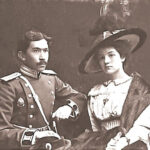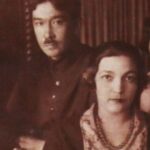Asfendiyarov Sanzhar’s wife – Rabiga Seralievna Asfendiyarova-Lapina (1893-1956)
She was born in Samarkand in 1893, Kazakh. Her parents were very educated people : father Seraly Lapin and mother Zukhra Akhmerova. He was an orientalist and educator, an expert on the culture and customs of the indigenous peoples of the Turkestan region. He was an educated and erudite person with various interests. Later he worked as a barrister. He opened a private law office in St. Petersburg, where he often had to defend the interests of his fellow tribesmen in the courts. Rabiga’s mother, Zukhra Akhmerova, was one of the few women who studied at the gymnasium of that time.
The Kazakh diaspora of St. Petersburg often gathered at the house of the well-known St. Petersburg lawyer Seraly Lapin. He was especially proud of his daughters. In St. Petersburg they were called oriental beauties. Rabiga studied at the “Pavlovsk Institute for Noble Maidens”. It was a closed-type higher educational institution for girls, where the daughters of nobles, officers and employees of the military departments were mainly studied. According to some documents Rabiga studied among other 5 Kazakh women at the Smolny Institute of Noble Maidens of Saint Petersburg. The charming Rabiga, or as she was called Ryabinushka, enjoyed success among the progressive noble youth.
Sanzhar Asfendiyarov, a descendant of Khan Abulkhair, a student of the St. Petersburg Military Medical Academy, often visited the Lapins’ house. Seeing Rabiga, he realized that he had fallen in love for life. Their love turned out to be mutual.
Brought up in strict rules, intelligent and educated Rabiga researched architecture, was engaged in Turkic studies, jurisprudence. For Sanzhar Asfendiyarov, she was the ideal.
In the spring of 1912 they got married. In 1912 S. Asfendiyarov and his wife went to his parents in Tashkent. Soon he received appointment to the border. There were no basic living conditions in the border military unit, and Sanzhar left his wife with his parents and traveled to his destination. During this period, Rabiga gave birth to a daughter, Aliya.
The First World War began. In Poland, near Lodz, the regiment of Asfendiyarov was surrounded. He was wounded and was taken prisoner and was in the German concentration camps in Kutno, Thorn, Aleksandrovka. Only in 1915, thanks to the help of the International Red Cross, some of the medical prisoners of war returned through Sweden to St. Petersburg. The separation from his wife lasted for several years. When he returned to Tashkent, his daughter Aliya was already growing up.
But the First World War had not ended yet, and the military doctor Asfendiyarov was sent to the front again. He met the October Revolution together with his family in Termez.
After Termez, Rabiga and her husband returned to Tashkent. Asfendiyarov was engaged in political activities – he headed the Council of Muslim Workers’ Deputies, later he became the first people’s commissar of Health care and at the same time the people’s commissar of department of Land and Water management of the Turkestan ASSR, a member of the collegium for nationalities, editor of newspapers and magazines.
The geography of his movements was quite wide. In the first years after the revolution, there were few educated people in the Turkestan region, and Asfendiyarov sometimes had more than one job. At Rabiga and Sanzhar a daughter Adolyat, was born in 1921. Rabiga was engaged in social activities in spite of household chores. She participated in various meetings and concerts. These charity concerts were aimed at helping the starving persons.
The last period of Asfendiyarov’s life was especially fruitful and took place in Alma-Ata. The leadership of the Kazakh Republic decided to create the first university and invited Asfendiyarov as an educated person and a talented organizer to Alma-Ata. Asfendiyarov became the first rector of the Kazakh Pedagogical Institute and the Almaty Medical Institute. The Medical Institute was named after Asfendiyarov.
In Alma-Ata, the Asfendiyarovs and Khalel Dosmukhamedov’s family lived in the house where the Turkish consulate is now located. You can imagine what this architectural masterpiece looked like at that time. In the middle of 30s of the last century Asfendiyarov’s house was the best house in Alma-Ata.
Their rich library and rare works on history collected by the owner for a long time in different cities, where he worked, were impressed especially. He always was together with his wife.
During this period, Rabiga got a job at the State Public Library. Until now, her documents, confirming this fact, are kept in the National Library of Almaty. During this period, she has suffered from bronchial asthma and Sanzhar made great efforts to send her together with her daughters for treatment to the Crimea and Kislovodsk. In letters he affectionately called her “Ryabochka”.
In the terrible 1937, Sanzhar Asfendiyarov was repressed. He was arrested by the NKVD on charges of counter-revolutionary nationalist activities, preaching the ideas of Pan-Turkism, and in 1938 he was shot.
His wife Rabiga also passed through the Stalin’s “meat grinder”. When her husband was repressed, Rabiga ended up in the prison ALZHIR ( Akmola prison of wives motherland traitors). She was sentenced by the CCA at the NKVD to 5 years in prison on July 21, 1938. She arrived in Akmola prison from the prison in Alma-Ata on October 3, 1938. All the horrors of the prison Rabiga passed with other people. So she was very ill, she worked less and her daily ration was less. In the camp, she was supported by a relative who was also serving time. Rabiga was released on May 5, 1943.
People said that Akmola prison was the most exemplary camp in all respects. Each woman did everything possible so that her husband’s situation did not worsen because of her. There were thousands of such women.
Rabiga had a presentiment the arrest and send her youngest seventeen-year-old daughter Adolyat to her mother to Uzbekistan. At that time the eldest daughter Aliya studied at the Institute of Foreign Languages in Moscow. After her rehabilitation, Rabiga Lapina never returned to Alma-Ata. The repressed people were forbidden to live in big cities.
Surviving after the prison, Rabiga went to her mother in Uzbekistan. She didn’t live to see the husband’s rehabilitation, she died from esophageal cancer in 1954. And four years after her death, Asfendiyarov’s good name was restored.
The eldest daughter of Sanzhar Asfendiyarov – Aliya (1913-date of death unknown)
The eldest daughter Aliya was born in 1913. She graduated from the Institute of Foreign Languages in Moscow. When her father Sanzhar Asfendiyarov was repressed in 1937, and then her mother was repressed, she was studying in Moscow at that time. Her aunt Rachilya lived here.
The youngest daughter of Sanzhar Asfandiyarov – Adolyat (1921 – date of death unknown)
The youngest daughter, Adolyat Asfandiyarova, was born in 1921. In 1937, according to some sources of information, she was transported by her mother Rabiga to Tashkent, according to other sources of information she was took across to Moscow. In Moscow her older sister Aliya studied at the Institute of Foreign Languages. With the beginning of the Great Patriotic War, Adolyat Asfendiyarova went to Tashkent, where her father’s sisters lived – the famous doctors Gulsum and Anela Asfendiyarov. Here she married a civil engineer Temirbay Gubaidullin. Their daughter Sophia was born in 1944. And soon Rabiga Lapina, released from the prison joined to their. Then her mother Rabiga died in 1954. Adolat Asfendiyarova, like her older sister, studied at the Institute of Foreign Languages.
Adolyat came to Alma-Ata in the late 50s, because the Kazakhstan government promised her to restore the heirs to their property rights. But nothing was found in their destroyed house. The rich library of Sanzhar Asfendiyarov also disappeared, it was confiscated with all its property in 1937.
Today Asfendiyarov’s granddaughter Sofia Temirbaevna Sultanova lives in Tashkent. She worked at the Research Institute of Microbiology, and then at the Research Institute of Genetics of the Uzbek Academy of Sciences. She is a researcher who has contributed to the development of microbiology and genetics. Asfandiyarova’s great-granddaughter Aliya Makhanbetnurovna Sultanova lives in Almaty, works as a PR manager at Europe Plus Radio.
Bibliography
- Balmaganbetova J. Seraly Lapin: from the galaxy of the first intellectuals // Kyzylorda regional Internet newspaper. -2019.-October 26
- Kamaliev M.A. S. D. Asfendiyarov: life-feat (To the 125th anniversary of his birth) // Bulletin of KazNMU.- 2014.-№ 2.-С.4
- Shimyrbaeva G. The granddaughter of Sanzhar Asfendiyarov wants to return home // Kazakhstanskaya Pravda. -16 July 2002.-№ 154





